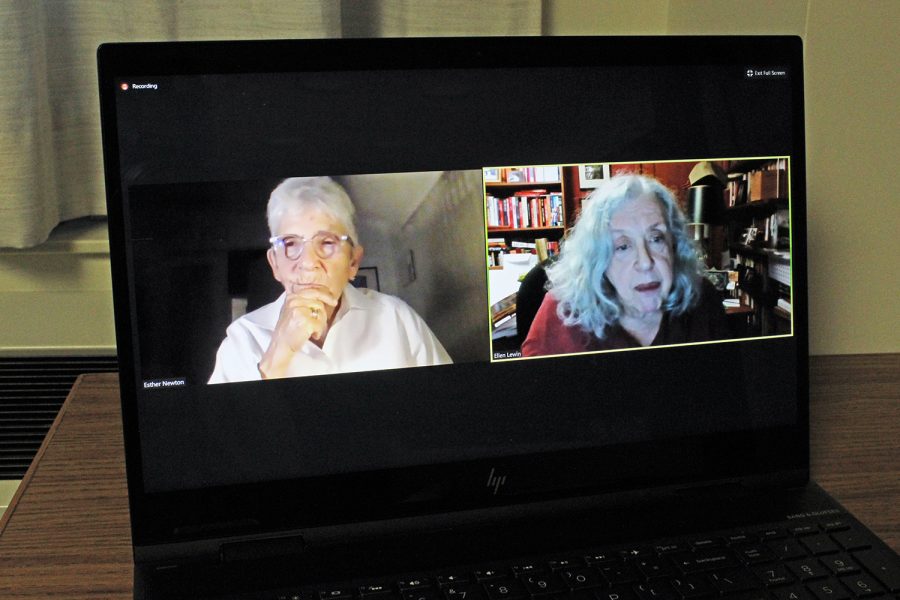Prairie Lights reading of Esther Newton’s latest memoir fosters discussion of LGBTQ issues and academia
Author Esther Newton read a passage from her memoir, “My Butch Career” at a Prairie Lights reading last night. Newton engaged in discussion with longtime friend Ellen Lewin about the difficulties of studying LGBTQ topics in anthropology.
Esther Newton, anthropologist and author of “My Butch Career: A Memoir,” answers questions from Ellen Lewin, a Professor Emeritus of Gender, Women’s, & Sexuality and Anthropology at UI during a virtual Prairie Lights reading on Wednesday, April 7, 2021.
April 7, 2021
A successful honorary lecture and PowerPoint presentation about her academic career led to author Esther Newton’s eventual publication of My Butch Career: A Memoir. She began the writing process in 1996 while she was still working full-time. The book was published 20 years later, in 2018.
Last night, Esther Newton read from her memoir at a Prairie Lights event and longtime friend Ellen Lewin, a retired professor from the University of Iowa, facilitated discussion with Newton about her work.
Newton is considered the founder of LGBTQ studies and a trailblazing anthropologist for others who studied LGBTQ communities after her. She has written numerous books such as Margaret Mead Made Me Gay: Personal Essays, Public Ideas. Her most recent publication is her memoir.
The memoir is structured chronologically and only covers the first half of Newton’s life. Rather than her own life, the book begins by telling the story of her parents.
“I’m very historically minded, I majored in history in college. So, my memoir doesn’t start with me, it starts with my parents,” Newton said during an interview with The Daily Iowan, prior to the reading. “They really set the cultural and psychological framework in which I was born.”
The book then details Newton’s childhood and young adult life and discusses the struggle of coming out during a time when being gay was highly stigmatized. She tells stories from her time as a closeted academic. The last part of the novel takes place in Paris, where she moved to become a novelist, and finishes with Newton reconciling with academia by getting involved with gay and lesbian studies.
RELATED: UI Theatre Department’s ‘Borderless’ presents audio experience that uplifts LGBTQ+ history
At the reading, Newton read a section of her book from when she met a man named Skip at a drag show. She said she had introduced herself as an anthropology graduate student and told the audience the story of how she came to write about drag queens for her dissertation, noting her fear that doing so would out herself as gay to the academic community. She came out to the drag queens she interviewed.
In an interview with the DI, retired professor Ellen Lewin stated that she wanted to explore the importance of historical context to the memoir and anthropological situations as a whole during the reading.
“The passage had to do with who she was, what stage of her life she was at, and what the historical context was,” Lewin said. “What I’d like to ask is what is important about putting it in that context because a lot of us don’t do that. We’re trained not to be so personal.”
When Newton finished reading the excerpt from her memoir, Lewin fielded questions from the audience and engaged in a discussion with Newton about how she came to understand her sexuality and how her dissertation topic affected her academic career. Newton stated that people were not studying the LGBTQ community and many people were not interested in her academic work because of that.
Lewin explained at the reading that Newton was a role model for her and helped pave the way for others who wished to do this kind of work.
“You were a wonderful example to me. We worked on different topics and worked in very different ways I think, but those of us who did this early on made it easier for people doing it later,” Lewin said.
The pair also engaged in some general discussion about drag and gender, based on questions asked by viewers of the reading.
Newton stated in an interview before the reading that she wanted the audience to hear her story and be inspired to do what they wanted to do with their lives despite the challenges they may face.
“I hope that the audience, especially students, will get out of it that you should follow your dream,” Newton said. “This was not a good career choice, but I think I would’ve been very miserable if I had followed the conventional path that was laid out for me. I especially want to encourage LGBT students to find their own truths and pursue them.”














